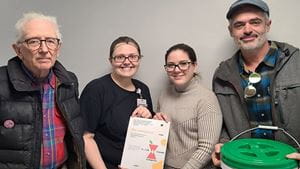
GOUVERNEUR, NY – Hundreds of pounds of food waste are no longer going into landfills, thanks to a recent collaboration between Gouverneur Hospital (GH) and North Country Compost (NCC).
The Canton-based business collects plant and animal sourced food scraps from the Hospital, and converts it into compost at their composting facilility. The food waste is combined with wood chips, horse manure, and other amendments and turned weekly in a large windrow. It takes approximately six months for the scraps to become compost, which can later be used to enrich soils.
“Changing our system to composting required minimal staff training and effort,” noted St. Lawrence Health Director of Food and Nutrition Services Lauren Prentice. “The main difference is where our food waste goes during the day. Before it was put down the garbage disposal and into our water systems, as well as in the garbage and then into landfills.
“Today our food waste is used to create a nutritious and usable resource. We also take pride in supporting local businesses and families in our regional community,” she added.
Unless food scraps are diverted from the waste stream, they end up in landfills where they are converted into methane, a greenhouse gas approximately 80 times more powerful than carbon dioxide. By composting the food scraps, the waste can become a useful soil amendment teaming with beneficial bacteria that improves the health of our soils.
NCC Founder Greg Todd explained that to forestall the worst effects of climate change, we all need to proactively engage in measures to stop the release of climate gases into the atmosphere; diverting food scraps from landfills is one such measure.
NCC Founder Cory Vinyard pointed out that along with conserving valuable landfill space, food composting minimizes the need for additional waste disposal sites.
“The environmental impact of food production extends beyond waste. By minimizing food waste, we help reduce the overall demand for agricultural land, which can help preserve natural habitats and biodiversity,” he said.
Taking Positive Strides
Ms. Prentice said she and her team at GH enjoy working with North Country Compost, whose management team is very passionate about what they are doing and accomplishing. She further noted the Hospital personnel are learning about the importance of composting, and have found the transition easy to manage.
“Hospitals are not currently required to compost their food waste, but this requirement is likely coming down the road. When St. Lawrence Health was presented with the opportunity in the summer of 2022, it made sense to move forward. We determined there was no need to wait when we could take immediate steps to get ahead of the movement and lead the composting effort in healthcare,” Ms. Prentice said.
The compositing project at Canton-Potsdam Hospital has been running smoothly since September 2022, when the Hospital partnered with Whitten Family Farm. Massena Hospital also began composting at that time.
“Diverting food scraps encourages individuals, businesses, and communities to adopt more sustainable practices. It raises awareness about the environmental impact of food waste and promotes responsible consumption and disposal habits,” Mr. Vinyard said.